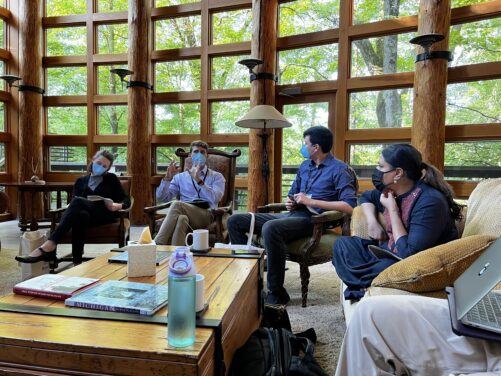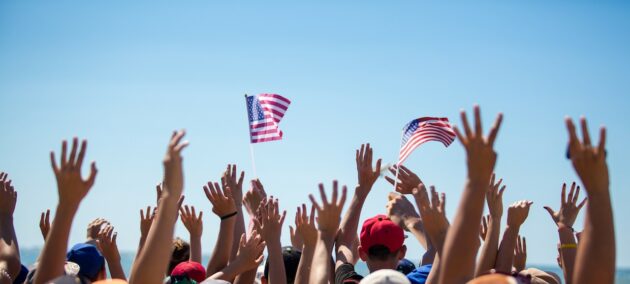The Religion, Spirituality, and Democratic Renewal (RSDR) Program of the Social Science Research Council (SSRC) aims to bring knowledge of the place of religion and spirituality into scholarly and public conversations about renewing democracy in the United States and around the world. This program is offered by the SSRC Program on Religion and the Public Sphere with the support and partnership of the Fetzer Institute.
Note: The deadline (March 20, 2023) for 2023 Religion, Spirituality, and Democratic Renewal Program applications has passed.
Overview
Religious and spiritual movements have often played distinct and at times contentious roles in the formation and persistence of democratic societies. Shifting religious and political landscapes recently came to a head in many countries amidst a pandemic that surfaced deep existing tensions and inequalities. This is a crucial time for understanding the intersection of religious and political transformations, not only in the United States (as has been the previous focus of this program) but around the world. This RFP will support work that seeks to discern whether, how, and under what conditions religion and/or spirituality shapes democratic systems of government, or significant democratic movements, and vice versa.
Through research on the intersection of religious and/or spiritual identities, behaviors, attitudes, and organizations with social and political structures, processes, and institutions, RSDR grantees will deepen understanding of the evolving relationships between religion, spirituality, and democracy at this moment in global history. Proposals must be explicit in their articulation of how the project will engage specific examples of religion and/or spiritual ideas or movements AND how the specific example is relevant to a contemporary question of democracy or democratic action in a particular location or locations.
Research Themes
For this year’s RFP, we especially seek projects that shed light on 1) the religious and spiritual dimensions of political polarization, 2) the ways religious ideas, actors, and institutions may (or may not) be contributing to more inclusive and civil democratic politics, and/or 3) the roles of religious and spiritual movements in democratic societies. While projects that critically analyze problematic or negative cases are eligible, this year’s competition especially seeks projects that shed light on positive examples of democratic renewal or the measurable increase of democratic social action.
Possible topics include, but are not limited to:
- Religious, spiritual, and theological dimensions of contemporary movements that seek to heal, challenge, or legitimate racial inequalities and exclusions
- Gendered dimensions of groups and movements that situate themselves at the nexus of religion and politics
- Political participation and the social mobilization of new or changing religious identities
- Debates within and between religious and spiritual groups that connect with broader political issues and public debates (e.g. the proper role of government in a democracy, climate change or environmental crises, etc.)
- The intersections of religion, media, and democracy
We welcome proposals from across all fields in the social sciences (including, but not limited to: anthropology, economics, geography, history, political science, and sociology), as well as the humanities, theology, and other relevant fields. Research projects using any social science methodology, quantitative, qualitative, or mixed, are eligible. This year projects focusing on any global context may be considered for funding.
Projects may take a historical perspective but must demonstrate strong relevance to the current moment. Projects are encouraged to engage with existing datasets or create new ones relevant to answering key questions about the connections between religion, spirituality, and democracy’s malaise and renewal. We also welcome projects focused on social media data and other innovative ways of gaining insight into the intersection between religion and democracy. Given the urgency and ongoing relevance of these themes, grantees will be expected to make their findings accessible to a broad range of audiences (e.g. through public scholarship, digital media components, etc.).
Research questions should focus tightly on specific empirical examples, and proposed research methods should be appropriate to answer those questions. Applications should demonstrate strong interest in disseminating findings to academic audiences, practitioners, and to broader interested publics.
Eligibility
The grant competition is open to doctoral students who have advanced to candidacy and to postdoctoral researchers within five years of their PhD at the time of application. Applicants working as professional researchers or university faculty without the PhD outside of the United States may be eligible, if they are not concurrently enrolled in an MA program, and are within five years of the commencement of their professional position, as demonstrated by their curriculum vitae. Applications are welcome from scholars at these career stages from any country in the world, but all application materials must be submitted in English.
Program Terms
The program offers research support over a period of up to 12 months. Doctoral candidates can receive between $8,000 and $15,000; Postdoctoral researchers can receive between $10,000 and $18,000 toward research-related expenses. Budgets that make efficient use of available funds are strongly encouraged, and all budgets will be reviewed by SSRC staff prior to finalizing awards to ensure equitable distribution of funds.
Grant funds may be used for activities directly related to research, such as travel expenses and accommodations, research equipment and supplies, support for research assistants, and costs for access to publications or proprietary databases. In exceptional cases, and in consultation with program staff, award funds may be used to cover other expenses.
If travel or in-person research is proposed, applicants should address any likely considerations that could impact the feasibility of their plans.
Proposals will be evaluated by a multidisciplinary selection committee on their overall quality and their potential to deepen understanding of the role that religion and spirituality play in democracy and to inform practical engagement around these issues.
Additional Program Activities
Grantees may participate in an interdisciplinary workshop during or upon completion of RSDR-funded research, with costs covered by the SSRC. The workshop will focus on fostering interdisciplinary dialogue on key research topics, writing for multiple audiences, public communication strategies, and cohort building.
Participants may also be invited to contribute an essay to the SSRC’s flagship web forum on religion and secularism, The Immanent Frame.



